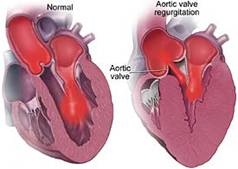Medicine Notes - Clinical Examination - Aortic Regurgitation

Aortic regurgitation
The common causes of aortic regurgitation are dilation of the aortic root, connective tissue disease ( Marfan syndrome), rheumatic heart disease, hypertension and endocarditis and ankylosing spondylitis.
The volume of the pulse is high and the patient may also present with collapsing pulse. There will be a wide pulse pressure in term of blood pressure. The apex beat is thrusting in nature due to overload of the volume and the apex beat is displaced due to dilation of the left ventricles . Aortic regurgitation may present with early diastolic murmur at the left sternal edges.In certain condition, aortic regurgitation may also be associated with Austin - Flint murmur which is a rumbling mid diastolic murmur due to regurgitation back into the mitral valve. Generally patient with aortic regurgitation may also present with carotid pulsation ( Corrigan’s sign ) and de Musset’ sign ( head nodding).
The commonest complications of aortic regurgitation are cardiac failure, angina and hypotension with diastolic less than 60mmHg.
The common causes of aortic regurgitation are dilation of the aortic root, connective tissue disease ( Marfan syndrome), rheumatic heart disease, hypertension and endocarditis and ankylosing spondylitis.
The volume of the pulse is high and the patient may also present with collapsing pulse. There will be a wide pulse pressure in term of blood pressure. The apex beat is thrusting in nature due to overload of the volume and the apex beat is displaced due to dilation of the left ventricles . Aortic regurgitation may present with early diastolic murmur at the left sternal edges.In certain condition, aortic regurgitation may also be associated with Austin - Flint murmur which is a rumbling mid diastolic murmur due to regurgitation back into the mitral valve. Generally patient with aortic regurgitation may also present with carotid pulsation ( Corrigan’s sign ) and de Musset’ sign ( head nodding).
The commonest complications of aortic regurgitation are cardiac failure, angina and hypotension with diastolic less than 60mmHg.
